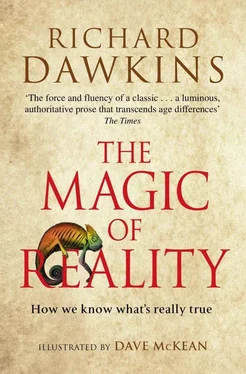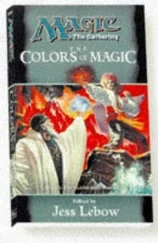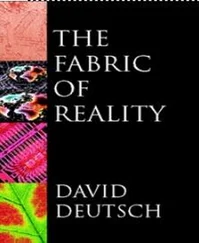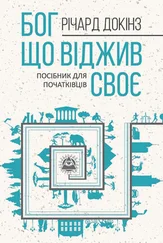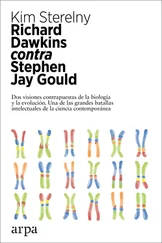Another thing that happens is that stories grow in the telling and re-telling. People enjoy a good story so much that they embellish it to make it a bit better than it was when they heard it. It is such fun giving people goose-pimples that we exaggerate the story – just a little, to make it a bit more colourful – and then the next person to pass the story on exaggerates a bit more, and so on. For example, having woken up to find that a famous person had died in the night, you might make enquiries to discover exactly when she died. The answer might come back, ‘Oh, it must have been approximately 3 a.m.’ Then you work out that you could well have been dreaming about her somewhere around 3 a.m. And before you know where you are, the ‘approximately’ and the ‘somewhere around’ get left out of the story as it does the rounds until it becomes: ‘She died at exactly 3 a.m., and that is exactly the moment when my cousin’s friend’s wife’s granddaughter was dreaming about her.’
Sometimes we can actually pin down the explanation of a weird coincidence. A great American scientist called Richard Feynman tragically lost his wife to tuberculosis, and the clock in her room stopped at precisely the moment she died. Goose-pimples! But Dr Feynman was not a great scientist for nothing. He worked out the true explanation. The clock was faulty. If you picked it up and tilted it, it tended to stop. When Mrs Feynman died, the nurse needed to record the time for the official death certificate. The sickroom was rather dark, so she picked up the clock and tilted it towards the window in order to read it. And that was the moment at which the clock stopped. Not a miracle at all, just a faulty mechanism.
Even if there had been no such explanation, even if the clock’s spring really had wound down to a stop at exactly the moment when Mrs Feynman died, we shouldn’t be all that impressed. No doubt at any minute of every day or night, quite a lot of clocks in America stop. And quite a lot of people die every day. To repeat my earlier point, we don’t bother to spread the ‘news’ that ‘My clock stopped at exactly 4.50 p.m., and (would you believe it?) nobody died .’
One of the charlatans I mentioned in the chapter on magic used to pretend he could restart watches by the ‘power of thought’. He would invite his large television audience to go and fetch any old broken-down watch in the house and clutch it in their hand while he tried to start it remotely with the power of thought. Almost immediately the phone in the studio would ring, and a breathless voice at the other end would announce, in awed tones, that their watch had started.
Part of the explanation may have been similar to that in the case of Mrs Feynman’s clock. It’s probably less true of modern digital watches, but in the days when watches had springs, simply picking up a stopped watch could sometimes restart it as the sudden movement activated the hairspring balance wheel. This can happen more easily if the watch is warmed up, and the heat from a person’s hand can be enough to do that – not often, but it doesn’t have to be often when you have 10,000 people, all over the country, picking up their stopped watches, perhaps shaking them, and then clutching them in warm hands. Only one of the 10,000 watches has to start in order for the owner to phone through the news in great excitement and impress the entire television audience. We never hear about the 9,999 watches that didn’t restart.
A good way to think about miracles
There was a famous Scottish thinker in the eighteenth century called David Hume who made a clever point about miracles. He began by defining a miracle as a ‘transgression’ (or breaking) of a law of nature. Walking on water, or turning water into wine, or stopping or starting a clock by the power of thought alone, or turning a frog into a prince, would be good examples of breaking a law of nature. Miracles like that would be very disturbing indeed to science, for the reasons discussed in the chapter on magic. Disturbing if they ever happened, that is! So how should we respond to stories of miracles? This was the question Hume turned to; and his answer was the clever point I mentioned.
If you want to know Hume’s actual words, here they are, but you have to remember that he wrote them more than two centuries ago, and English style has changed since then.
No testimony is sufficient to establish a miracle, unless the testimony be of such a kind, that its falsehood would be more miraculous than the fact which it endeavours to establish.
Let’s put Hume’s point into other words. If John tells you a miracle story, you should believe it only if it would be even more of a miracle for it to be a lie (or a mistake, or an illusion). For example, you might say, ‘I would trust John with my life, he never tells a lie, it would be a miracle if John ever told a lie.’ That’s all well and good, but Hume would say something like this: ‘However unlikely it might be that John could tell a lie, is it really more unlikely than the miracle that John claims to have seen?’ Suppose John claimed to have watched a cow jump over the moon. No matter how trustworthy and honest John might normally be, the idea of his telling a lie (or having an honest hallucination) would be less of a miracle than a cow literally jumping over the moon. So you should prefer the explanation that John was lying (or mistaken).
That was an extreme and imaginary example. Let’s take something that really happened, to see how Hume’s idea might work in practice. In 1917, two young English cousins called Frances Griffiths and Elsie Wright took photographs, which they said were of fairies. To modern eyes, the photographs are obvious fakes, but at the time, when photography was still quite a new thing, even the great writer Sir Arthur Conan Doyle, creator of the famously un-foolable Sherlock Holmes, was taken in by it, and so were quite a lot of other people. Years later, when Frances and Elsie were old women, they came clean and admitted that the ‘fairies’ were nothing more than cardboard cut-outs. But let’s think like Hume, and work out why Conan Doyle and the others should have known better than to fall for the trick. Which of the following two possibilities do you think would be the more miraculous, if it were true?
1. There really were fairies, tiny people with wings, flitting about among the flowers.
2. Elsie and Frances were making it up, and faking the photographs.
It’s really no contest, is it? Children play make-believe all the time, and it is so easy to do. Even if it were hard to do; even if you felt that you knew Elsie and Frances very well, and they were always completely truthful girls, who would never dream of playing a trick; even if the girls had been given a truth drug, and had sailed through a lie-detector test with flying colours; even if this all added up to its being a miracle if they told a lie, what would Hume say? He would say that the ‘miracle’ of their lying would still be a smaller miracle than the fairies they claimed to show actually existing.
Elsie and Frances didn’t do any serious harm with their prank, and it is even rather funny that they managed to fool the great Conan Doyle. But such tricks by young people are sometimes no laughing matter, to put it mildly. Back in the seventeenth century, in a village in New England called Salem, a group of young girls became hysterically obsessed with ‘witches’, and started imagining, or making up, all sorts of things which, unfortunately, the very superstitious adults of the community believed. Numerous older women, and some men too, were accused of being witches in league with the devil, and of casting spells on the girls, who said they had seen them flying through the air, or doing other strange things that witches were popularly believed to do. The consequences were extremely serious: the girls’ testimony sent nearly twenty people to the gallows. One man was even ceremonially crushed under stones, which is an appalling thing to happen to an innocent person, purely because a group of children made up stories about him. I can’t help wondering why the girls did it. Were they trying to impress each other? Could it have been a bit like the cruel ‘cyber-bullying’ that happens today in emails and on social networking sites? Or did they genuinely believe their own tall stories?
Читать дальше
